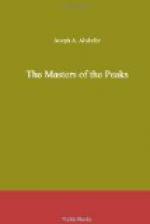Now, that terrible hunger, although he had striven to fight it, assailed him once more, and his will weakened slowly. What were those tales Tayoga had been telling about men going a week or ten days without food? They were clearly incredible. He had been less than two days without it, and his tortures were those of a man at the stake.
Willet’s eyes, from natural keenness and long training, were able to pierce the dusk and he showed the way, steep and slippery though it was, with infallible certainty. They were on a lower slope, where by some freak of the weather there was snow instead of slush, when he bent down and examined the path with critical and anxious eyes. Robert and Tayoga waited in silence, until the hunter straightened up again. Then he said:
“A war party has gone down the pass ahead of us. There were about twenty men in it, and it’s not more than two hours beyond us. Whether it’s there to cut us off, or has moved by mere chance, I don’t know, but the effect is just the same. If we keep on we’ll run into it.”
“Suppose we try the ascent and get out over the ridges,” said Robert.
Willet looked up at the steep and lofty slopes on either side.
“It’s tremendously bad footing,” he replied, “and will take heavy toll of our strength, but I see no other way. It would be foolish for us to go on and walk straight into the hands of our enemies. What say you, Tayoga?”
“There is but a single choice and that a desperate one. We must try the summits.”
They delayed no longer, and, Willet still leading, began the frightful climb, choosing the westward cliff which towered above them a full four hundred feet, and, like the one that faced it, almost precipitous. Luckily many evergreens grew along the slope and using them as supports they toiled slowly upward. Now and then, in spite of every precaution, they sent down heaps of snow that rumbled as it fell into the pass. Every time one of these miniature avalanches fell Robert shivered. His fancy, so vitally alive, pictured savages in the pass, attracted by the noise, and soon to fire at his helpless figure, outlined against the slope.
“Can’t you go a little faster?” he said to Willet, who was just ahead.
“It wouldn’t be wise,” replied the hunter. “We mustn’t risk a fall. But I know why you want to hurry on, Robert. It’s the fear of being shot in the back as you climb. I feel it too, but it’s only fancy with both of us.”
Robert said no more, but, calling upon his will, bent his mind to their task. Above him was the dusky sky and the summit seemed to tower a mile away, but he knew that it was only sixty or seventy yards now, and he took his luxurious imagination severely in hand. At such a time he must deal only in realities and he subjected all that he saw to mathematical calculation. Sixty or seventy yards must be sixty or seventy yards only and not a mile.




